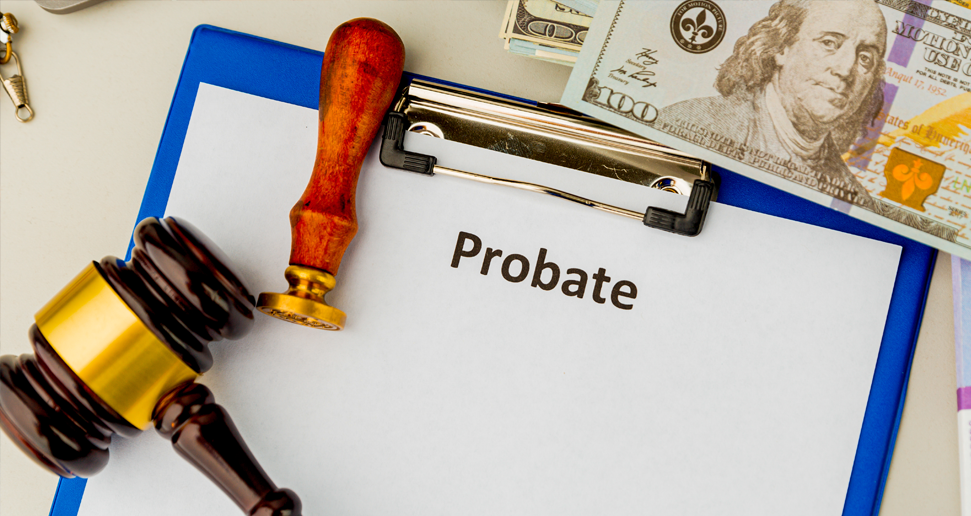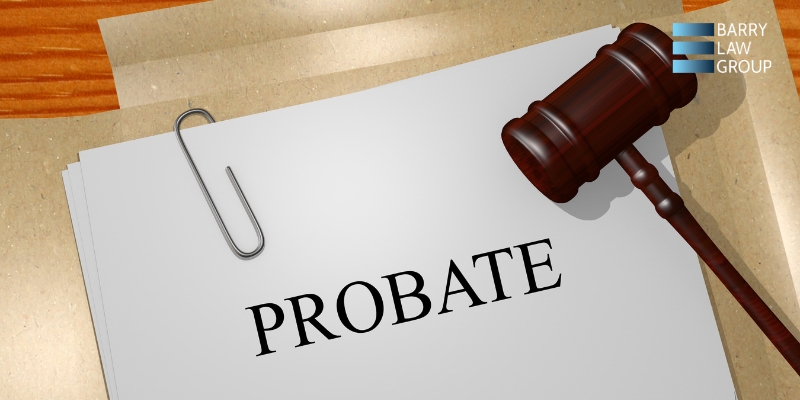Encino Trust And Probate Lawyer


Probate Administration Attorney in Encino, CA
If you have recently lost a loved one and are unsure of your next steps, Barry Law Group can help. If you are an heir or beneficiary of an estate, Barry Law Group can advise you on your rights. As a personal representative of an estate, such as an executor or administrator, certain procedures must be followed when administering the estate of a deceased individual to ensure that his or her affairs are properly settled, including proper distribution of the decedent’s estate.

What Is Probate Administration?
Probate administration commonly involves administering an estate of a deceased person, also called a “decedent.” However, it also includes administration of conservatorships and guardianships. In the case of a decedent’s estate, conservatorship or guardianship, the probate court oversees the administration process. Among the goals of an administration are proper notice to those interested in the estate, the payment valid and proper debts and expenses of the estate, that the intent of a decedent under his or her will is carried forth or that the proper heirs receive their distributions pursuant to law, that fiduciary duties of the personal representative to the beneficiaries or heirs are followed, and, in the case of guardianships and conservatorships, that the needs of the ward or conservatee are met.
Is It Important to Hire An Attorney for Estate Administration?
Hiring a competent and experienced attorney will ensure that the duties and responsibilities of the personal representative are properly executed, that the personal representative is protected, that the decedent’s wishes regarding his or her estate are followed as intended and that the proper heirs or beneficiaries receive their distributions. The protection and transfer of estate assets, interpretation of the decedent’s will, adherence to fiduciary duties, compliance with the probate code’s requirements for accountings and keeping beneficiaries, heirs and creditors adequately informed are all important aspects of estate administration. In particular, a family member of the decedent who is appointed as executor and is not familiar with the laws and procedures of estate administration should hire an attorney to help guide him or her through the administration process.

Probate of a Decedent’s Estate Can Be Complicated
Probate is a court-supervised process that takes place after someone dies. It is necessary to make sure that the decedent’s debts are paid and that the assets of the estate are distributed according to the will of the deceased, if he or she left a will or according to the probate code pursuant to statutes governing intestate distribution. This process can be very complicated. A probate is typically initiated by filing a Petition for Probate with the probate court. The Petition for Probate asks that the Court appoint a personal representative, called an executor or administrator, to preside over the estate and its administration. In the probate process, the Court will require that the personal representative follow certain steps to ensure that notice of the probate is given to necessary parties, that valid debts of the decedent are paid, that the personal representative marshal (or, collect) and report all assets belonging to the estate, and that the assets are properly distributed to the rightful heirs or beneficiaries. It is important that executors and administrators of an estate seek consultation with an experienced probate attorney for guidance and counsel.
Is Probate Administration Necessary?
Probate administration is not necessary if the decedent created a revocable, living trust or other trust instrument during his or her lifetime. If the decedent left a will or did not leave any instrument to distribute his or her property after death, then some form of probate proceedings will be necessary to distribute his or her assets.
Understanding the Probate Administration Process for a Decedent’s Estate
The following steps are typically part of the probate administration process in a decedent’s estate:
Step 1: A petition for appointment of a personal representative is filed. If the decedent left a will, the court will likely appoint an executor named in the will. In that case, a petition for executory letters is filed that asks for an executor named in the will to be appointed. If the decedent died without a will, then a petition for letters of administration is typically filed. A person is qualified to act as an administrator of the estate if they are interested in the estate as a surviving spouse, heir, family member, guardian or conservator of the decedent, a public administrator or a creditor. A list of priority of these different groups can be found in Probate Code section 8461. The petition is most often filed in the jurisdiction where the decedent died. For instance, if the decedent died in the County of Los Angeles, the petition is filed in the Los Angeles Superior Court, Probate Division. Upon filing a petition for letters executory or administration, the person filing the petition, called, the “petitioner,” must give notice of the petition to all persons interested in the estate (beneficiaries, heirs, known creditors, etc.), typically by mail and by publication in a locally circulated newspaper or journal. Unless the will of the decedent waives the requirement of a bond, the personal representative will also need to qualify for and obtain a bond based on the estimated value of certain or all the assets in the estate. Importantly, any person interested in the estate may file an objection to the appointment sought by a petition. Then, the appointment is “contested” and will require the court to decide the appropriate personal representative to appoint, which may require several court hearings and a trial. Barry Law Group has handled the appointment of varying types of personal representatives, including executors named in a will, spouses, heirs and other family members entitled to appointment and creditors, in both contested and uncontested situations.
Step 2: The personal representative must marshal (collect) and inventory the decedent’s assets, determine any debts owed by the estate, and secure (protect) the assets. Marshalling the assets may require changing title to real property or bank accounts, gathering and storing personal property (such as, furnishings, art, jewelry, vehicles and other personal affects) and storing or placing the assets into accounts or physical locations controlled by the personal representative. The personal representative then files one or more Inventory & Appraisals that lists the assets of the estate and their values. Typically, the court will appoint a probate referee to appraise the estate’s non-cash assets. During probate administration, the personal representative may need to sell assets, such as real estate, vehicles, art, jewelry, or other personal property independently or in a court supervised hearing (most often, as to real estate). Sometimes, a third party has possession of property that the personal representative believes or determines belongs to the estate. If the third party holding the asset refuses to turn it over to the estate, the personal representative may need to file a petition for a court order requiring the third party to turn over the asset. Probate Code section 850, et seq., provides the grounds and procedures for a personal representative to claim property for the estate that is held by a third party. There are numerous other potential procedures and complications that arise during the administration of a decedent’s estate, all of which cannot be enumerated here. It is important that a personal representative retain competent and experience legal counsel to assist during the estate administration process.
Step 3: The personal representative may be required to file one or more accountings of the estate with the court. An accounting must conform to specific requirements in the Probate Code (see, e.g., Probate Code sections 1060 – 1064) and must be provided to persons who are interested in the estate for review. In general, an accounting sets forth the value of the estate at the beginning and end of the accounting period, assets received during administration of the estate, receipts and income of the estate, disbursements for expenses of the estate, gains and losses on sales of assets in the estate, any distributions to beneficiaries, and the assets at the end of the accounting period. Other disclosures are also required. A person interested in the estate is permitted to file objections to an accounting, claiming that the personal representative did not properly follow his or her duties and responsibilities in administering the estate. An objection to an accounting creates a legal dispute that, much like any litigation, must be resolved through investigation, discovery, legal briefing and, if a settlement cannot be reached, in a trial. In the case of a contested accounting, a personal representative should hire an attorney experienced in estate litigation, such as the attorneys at Barry Law Group.
Step 4: Ultimately, the personal representative will file a final account and a request to distribute the remaining estate to the rightful heirs, beneficiaries and creditors. Again, an interested person may object to the final accounting and distribution plan. If there is no objection, or after the objection is resolved by settlement or trial, the court will be asked to approve the accounting, allow the distributions set forth in the request for final distribution and discharge the personal representative after the required distributions and disbursements are made. A personal representative (and his or her counsel) is also typically entitled to receive compensation from the estate as set by statute (called, “statutory fees.”) For services that go beyond typical aspects of administration, a personal representative (and his or her counsel) may also be entitled to additional fees (called, “extraordinary fees.”) Both statutory and extraordinary fees must be approved by the court.
Numerous other procedures and steps of an estate administration may be required before the estate may be closed. That is why it is important for a personal representative to retain legal counsel to ensure that an estate is properly administered for the benefit of the beneficiaries or heirs and that the liability of the personal representative is limited.
Contact Our Encino Trust And Probate Lawyers Today
Our Encino probate and trust administration lawyers are here to help you understand your duties and rights and offer advice and assistance to ensure the administration of the decedent’s estate proceeds smoothly. Connect with us today online or call for a consultation. We can discuss the best next steps for your particular case.
Success of Your
Legal Matter.
Barry Law Group is comprised of attorneys and longtime staff members who are committed to the success of your legal matter. The firm understands that for most litigation is uncharted worrisome and often terrifying.


